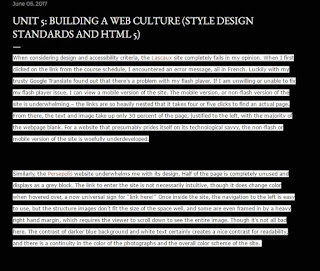In searching on Google for a wide range of history blogs to
compare and contrast, I first noticed that the search “history blogs” would get
me nowhere. As mentioned in the last reading, there are so many blogs on the
internet today that finding a credible authority on a specific topic can take
some serious digging. Another issue with the world of blogs – how best to distinguish
which are truly active? In searching I’ve found several that I would read, only
to find out that they stopped posting abruptly several years ago. Depending on the
audience, it is conceivable that a person could stop posting one day if only
their mother and next door neighbor’s cat were avid readers. The size of the
audience could also dictate the amount of effort an author is willing to put
into posts. If the poster isn’t relying on the blog for monetary gain or fame,
it would be much easier to pack it up when it got boring.
I am interested in a wide range of historical topics, but most
often local history and European history. I leaned on curated historical blog
lists to find contenders once the individual search strings proved unfruitful.
Marie Antoinette's Gossip Guide to the 18th Century is a blog that claims to "explore the age of Louis XVI. It focuses on art, fashion, architecture, music, scandals, and our favorite French débutantes as well as 18th-century inspirations in pop culture." A new post is published every few months and each post relies heavily on images of 18th century paintings and drawings with a small amount of text to contextualize the theme of the post and it's relation to Marie Antoinette. For example, "The secret history of Marie Antoinette's perfumer" provides three paragraphs about the perfumer, his history, and the suggestion to read the book the information came from, A scented palace: the secret history of Marie Antoinette's perfumer. This blog does a good job of providing the reader with basic information and relevant images, but the blogs own description and what it delivers are incongruous.
Ancient Foods is maintained by a "chef, artisan bread baker, ancient food historian, food archaeologist and anthropologist as well as a writer" and is formatted as a more traditional blog. Relevant information is parsed from news outlets, including archaeology.org and PBS, and re-posted with this author's own thoughts and understandings framing the information. The posts are text heavy, with usually only one picture to illustrate the food or location. This blog is a streamlined source for information about a specific topic, ancient food, in which the reader relies on the blogger to flag interesting and relevant articles.
Mental Floss is a well-known site with a staggering amount of information, organized into what I'll call fact-clusters. Posts are dedicated to a specific topic and often have names like "10 Facts About the Tomb of the Unknown Soldier" or "On This Day in History..." The site is a blog in a broad sense because it does provide timely postings of historical information, but the way the information is almost always displayed in a list form makes it different than the other two discussed in this post. I would argue that this type of posting is accessible to millennials and generation z-ers (the generation after millennials) who are accustomed to scanning large amounts of data for relevant information.
Using the above I've demonstrated different ways in which a blog can enhance the study of history -- through curated images, a synthesis of topic relevant articles, and in fact-clusters.
I've chosen to follow the American Antiquarian Society and Boundary Stones on Facebook. I found the American Antiquarian Society's blogs in my searches and find the photos and videos they post on their Facebook interesting. Boundary Stones provides a wealth of information and I plan to spend some time sifting through the site. Following them on Facebook will allow me to stay "in the know" about upcoming articles and programming.

Boundary Stones in a great blog. I stopped working on my blogs about a year ago. Time was one reason why, and also I've got other projects going on. Keeping a blog and constantly publishing new information takes a lot of work.
ReplyDelete